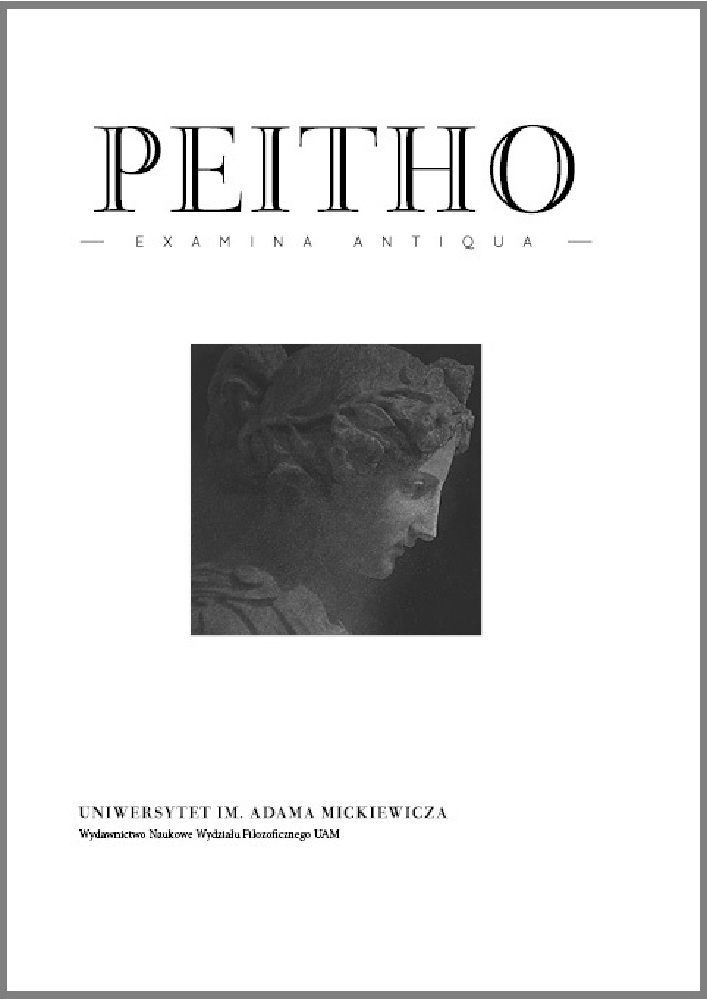Abstract
While the article discusses the factors that motivated Socrates’ decision
in the Crito, it emphasizes the possible cultural import of the choice
undertaken in the aftermath of the political upheavals in the late fifth
century. It is also argued here that as Plato’s dialogue were written in
the period that followed the renewal of the Athenian politeia, it should
be perceived as having its roots both in the historical reality of its narrative
focus (i.e. Socrates’ trial) and in the then reality of Plato’s Athens
(i.e., its political stability dependent on the ephebic oath).
References
Allen, D.S., 2000, World of Prometheus. The politics of punishing in democratic Athens, Princeton.
Barker, A., 1977, “Why did Socrates refuse to escape”, Phronesis 22, pp. 13–28.
Bostock, D., 2005, “An Interpretation of Plato’s Crito”, in: R. Kamtekar (ed.) Plato’s Euthyphro, Apology, and Crito, Lanham, pp. 210–228 [originally published in Phronesis 35 (1990), pp. 1–20]
Bravo, B., 1988, Wipszycka–Bravo, E. Historia starożytnych Greków, t. I, Warszawa.
Brickhouse, T., Smith, N., 2005, „Socrates and Obedience to the Law”, in: R. Kamtekar (ed.), Plato’s Euthyphro, Apology, and Crito, Lanham, pp. 183–174 [originally published in Apeiron 18 (1984) 10–18].
Christ, M. R., 2001, “Conscription of hoplites in classical Athens”, CQ 51, pp. 398–422.
Gagarin, M., 1986, Early Greek Law, Berkeley–Los Angeles.
Gernet, L., 2004, “Capital Punishment”, in: P. J. Rhodes (ed.) Athenian Democracy, Oxford, p. 132–158.
Greenberg, N. A., 1965, “Socrates’ Choice in the Crito”, HSCPh 70, pp. 42–82.
Hansen, M. H., 1991, Athenian Democracy in the Age of Demosthenes: Structure, Principles and Ideology, Oxford 1991 (I used the Polish translation by R. Kulesza, Demokracja ateńska w czasach Demostenesa, Warszawa 1999).
Harris, W.V., 2002, Restraining Rage. The Ideology of Anger Control in Classical Antiquity, Harvard.
Harte, V., 2005, „Conflicting Values in Plato’s Crito”, in: R. Kamtekar (ed.) Plato’s Euthyphro, Apology, and Crito, Lanham, pp. 229–259 [originally published in AGPh 81 (1999), pp. 117–147].
Knox, B. M. W., 1964, The Heroic Temper. Studies in Sophoclean Tragedy, Berkeley–Los Angeles–London.
Konstan, D., 2006, The Emotions of the ancient Greeks. Studies in Aristotle and Classical Literature, Toronto.
Kraut, R., 1984, Socrates and the State, Princeton.
McLaughlin, R. J., 1976, „Socrates on Disobedience: a response to Gary Young” Phronesis 21, pp. 185–197.
Mikalson, J. D., 1991, Honor Thy Gods. Popular Religion in Greek Tragedy, Chapel Hill–London.
Nightingale, A. W., 1992, „Plato’s Gorgias and Euripides’ Antiope: a study of generic transformation”, ClAnt 11, pp. 121–141.
Ober, J., 1998, Political Dissent in Democratic Athens. Intellectual Critics of the Popular Rule, Princeton.
Penner, T., 1997, „Two notes on the Crito: the importance of the many and Persuade or Obey”, CQ 47, pp. 133–147.
Penner, T., 2005, „Socrates”, in: Ch. Rowe, M. Schofield (eds.), The Cambridge History of Greek and Roman Political Thought, Cambridge, pp. 164–189.
Reeve, C. D. C., 2005, The Trials of Socrates: Six Classic Texts, Indianapolis.
Royle, T., 1999, Crimea. The Great Crimean War 1854–1856, London.
Sauve Meyer, S., „Plato on the Law”, in: H. H. Benson (ed.), A Companion to Plato, Malden–Oxford–Carlton, pp. 373–387.
Siewert, P., 1977, „The Ephebic Oath in Fifth Century Athens” JHS 97, pp. 101–111.
Van’t Wont, P. E., 2010, “Solon’s Law on Stasis. Promoting Active Neutrality”, CQ 60, pp. 289–301.
Young, G., 1974, „Socrates and Obedience”, Phronesis 19, pp. 1–29.
License
Peitho provides immediate open access to its content on the principle that making research freely available to the public supports a greater global exchange of knowledge.
